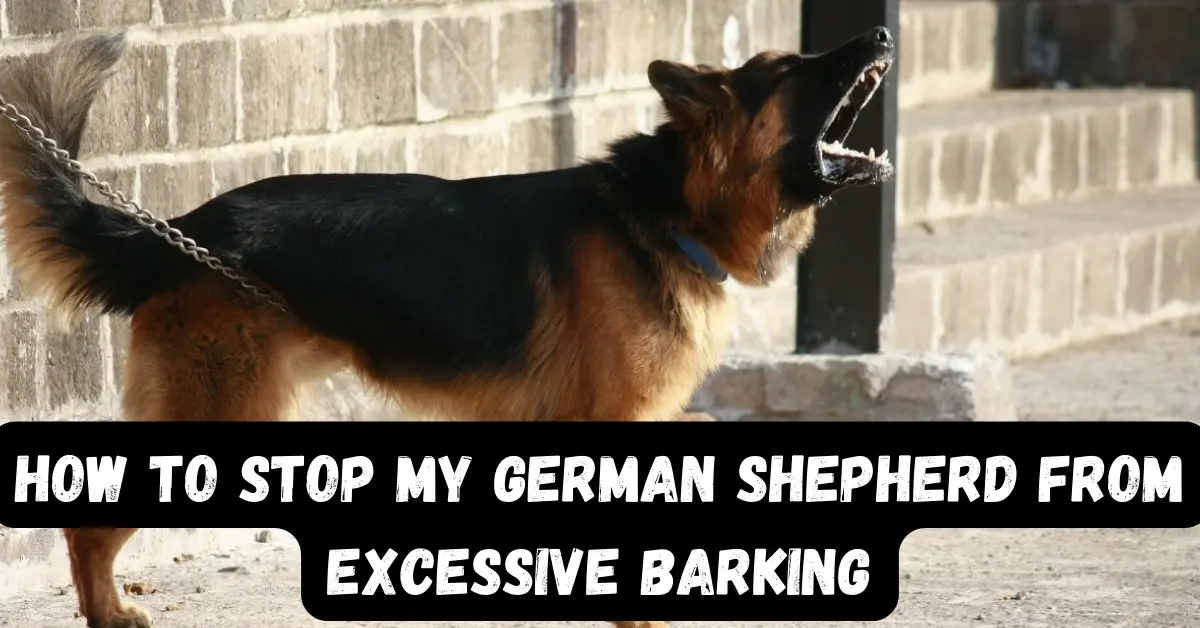Excessive barking in German Shepherds can be a common concern for dog owners. While barking is a natural form of communication for dogs, it can become problematic when it occurs excessively or inappropriately. Addressing this behavior requires a multi-faceted approach that encompasses understanding the root causes, consistent training techniques, environmental modifications, and fostering a strong bond with your canine companion.
Why Dog Bark? Reason Behind This
Dogs bark for a variety of reasons, using this vocalization as a form of communication. Understanding why dogs bark is crucial for addressing their needs and ensuring their well-being. Here are some common reasons why dogs bark:
Communication
Dogs bark to communicate with both humans and other dogs. They might bark to alert you about something unusual or to let other dogs know about their presence. This type of barking is often short-lived and stops once the message is conveyed.
Alert or Warning
Dogs have a natural protective instinct. They bark when they sense potential threats, such as a stranger approaching the house or an unfamiliar noise. This type of barking is usually loud and intense.
Attention-Seeking
Dogs may bark to get attention, whether they want to play, be petted, or receive treats. If they notice that barking leads to a reaction from you, they might continue this behavior to get what they want.
Boredom or Loneliness
When dogs are bored or left alone for extended periods, they might bark to alleviate their feelings of isolation. Barking serves as a way to cope with their emotions and stimulate themselves.
Anxiety or Fear
Dogs experiencing anxiety or fear may bark excessively as a way to express their distress. This can happen when they encounter new environments, people, or other animals that make them uncomfortable.
Territorial Behavior
Dogs are territorial animals, and they might bark to establish and defend their territory. This is often seen when they feel their space is being invaded, either by humans, other dogs, or even wildlife.
Playfulness
Playful barking is common during interactions with other dogs or when engaging in games with their owners. It’s usually accompanied by wagging tails and a relaxed body posture.
Medical Issues
In some cases, dogs might bark excessively due to underlying medical conditions causing pain or discomfort. If your dog’s barking pattern changes suddenly, it’s a good idea to consult a veterinarian.
Hunger or Thirst
Dogs may bark if they’re hungry or thirsty, especially if their feeding routine has been disrupted.
Reproductive Instincts
Unspayed or unneutered dogs might bark excessively when they detect the presence of other dogs in heat. This behavior is a part of their natural reproductive instincts.
Understanding the Behavior

Understanding the underlying reason for your dog’s barking is the first step in addressing the behavior. By identifying the trigger, you can then take appropriate steps to train and manage your dog’s barking. Keep in mind that while some barking is normal and healthy, excessive or inappropriate barking can often be modified through training, socialization, and addressing their physical and mental needs. Here are the top 10 secrets that how we can stop our German shepherd from excessive barking
1. Identify the Triggers
Begin by identifying what triggers your German Shepherd’s excessive barking. It could be strangers, other dogs, specific noises, or even boredom. Understanding these triggers allows you to tailor your training approach accordingly.
2. Consistent Training
Consistency is key when training your German Shepherd. Use commands like “quiet” or “enough” consistently when they start barking excessively. Reward them immediately when they stop barking on command. Gradually increase the duration of quiet behavior before giving rewards.
3. Positive Reinforcement
Utilize positive reinforcement techniques by rewarding your dog with treats, praise, or playtime when they exhibit calm behavior. This encourages your German Shepherd to associate quietness with positive outcomes.
4. Provide Mental and Physical Stimulation
A tired dog is less likely to engage in excessive barking. Regular exercise, interactive toys, puzzle games, and obedience training sessions provide mental and physical stimulation, reducing boredom and the urge to bark excessively.
5. Desensitization and Counterconditioning
Expose your German Shepherd to the triggers that typically set off excessive barking, but in controlled and gradual increments. Pair these triggers with positive experiences like treats or playtime, helping your dog associate positive emotions with previously distressing situations.
6. Create a Calm Environment
Minimize external stimuli that can trigger barking. Close windows or use curtains to reduce visual triggers. Play soothing background music or use white noise to mask outside noises that might agitate your dog.
7. Teach the “Speak” and “Quiet” Commands
Surprisingly, teaching your dog to bark on command can help them understand when it’s appropriate to bark. Pair the “speak” command with a treat, and then introduce the “quiet” command, rewarding them for stopping barking on cue.
8. Socialization
Expose your German Shepherd to various people, dogs, and situations from an early age. Proper socialization can reduce fear and anxiety, leading to fewer instances of excessive barking due to perceived threats.
9. Professional Training and Behavioral Consultation
If your German Shepherd’s excessive barking persists despite your efforts, consider seeking professional help from a certified dog trainer or behaviorist. They can tailor a training plan to your dog’s specific needs.
10. Build a Strong Bond
Foster a strong bond of trust and companionship with your German Shepherd. Dogs that feel secure and connected to their owners are less likely to engage in excessive barking for attention or anxiety.
Conclusion:
Mastering the art of curbing excessive barking in your German Shepherd demands patience, consistency, and a holistic approach. By identifying triggers, implementing consistent training techniques, and addressing the underlying causes, you can create a harmonious environment where excessive barking becomes a thing of the past. Remember, every dog is unique, so tailor your approach to your German Shepherd’s individual needs, and enjoy the rewarding journey of a quieter and happier canine companion.
FAQs
Why does my German Shepherd bark at nothing?
When a German Shepherd barks excessively, it might be due to boredom, anxiety, or inadequate training. It’s helpful to recommend positive reinforcement training methods to your neighbor and suggest engaging activities for their dog to help address the issue.
How do you calm down a German Shepherd?
Ensuring mental engagement is key for German shepherds. These intelligent dogs thrive on mental stimulation, which helps keep them content and relaxed. Engage them with activities like teaching new tricks, interactive puzzle games, or even hiding treats around the house for a fun scavenger hunt. Additionally, consider using a calming collar or spray to further support their tranquility and well-being.
Is it normal for German Shepherds to bark a lot?
The inclination of German Shepherds to bark traces back to their roots in herding, where they served to protect and alert their owners. Their strong guarding instincts make them naturally vocal compared to other breeds. Just like humans use language to communicate, German Shepherds bark to express themselves and convey messages to their owners.
Do dogs get tired of barking?
It’s fascinating how dogs never seem to tire of barking. In fact, the more they bark, the more inclined they are to continue. Barking is inherently self-reinforcing for our furry companions; it’s something that brings them genuine joy. Similarly, behaviors like chewing and chasing also fall into this category of self-reinforcement, where the action itself serves as the reward. It’s all part of what makes our canine friends so unique and endlessly intriguing.

